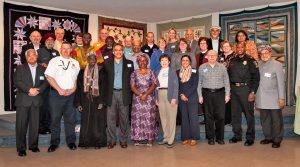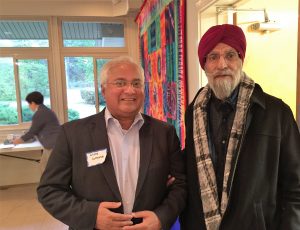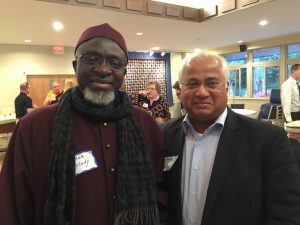Pakistan Pluralism
A few years ago, I received calls from Multan and Karachi about Pluralism, then we had three delegations from Pakistan as Department of State's guests with whom I spent half a day each sharing what Pluralism means and how the interfaith activities are carried forward here in the United States.
In September 2016, Syed Yaqoob Shah of Karachi, Pakistan and I worked on conducting seminars on Interfaith in Pakistan, my health did not permit me, but Shah Saheb made it happen and now he has taken interfaith activism to new heights and hosts a weekly show on Facebook. When Diwali was celebrated, he invited key Muslim religious leaders and we talked about eating the Prasad - food blessed in the name of God. For Hindus is it divine, for Muslims, it is just good tasting food given with affection and caring. Allama Muhammad Ashsan is another Aalim who is in the forefront of the Interfaith movement in Pakistan.
Now in the last few months, there is a burst of activism in Pakistan about Pluralism, some great articles have been written about it. They are all here at the Center for Pluralism site which you can also access as www.PluralismNews.com - It is about Pluralism in religion, politics, society, and culture across the globe, particularly in places where there are more than two or three religious, political parties and ethnicities exist.
Mike Ghouse
Center for Pluralism
Courtesy of Wire, February 26, 2018
BY SAMEER SHAFI WARRAICH

It came as no surprise that I found myself completely oblivious to what Thar had to offer. The images I had of the ‘other’ turned out to be a mere fragment of my own imagination.
I had heard stories of inter-religious harmony and pluralism bequeathing the region and always wondered, why has this become such an exception? Why does the rest of Pakistan choose to treat this sense of diversity as exotic? And why has one side of the border chosen to estrange itself from Thar while the other has embraced it? I wanted answers.
The quest began some 1,500 km away from my hometown, Rawalpindi, which used to be home to over 350 mandirsbefore Partition, but now has only one. I hoped this long journey to the desert wasn’t going to be a repeat of an illicit memory of the past. Hindus forgotten and disowned, in the land of the ‘pure’.

Thar Desert, or Tharparkar in Sindh, for millennials, is a name synonymous with horrific images of drought and famine. Many Pakistanis detached from Thar often think of this land as an anomaly when compared to the rest of the country. Alongside poverty and malnutrition, this desert invokes a sense of alienation amongst many citizens.
With a majority Hindu in population, still imbued with the deeply-rooted caste system, and frankly, ‘too close to India’, we have quite conveniently chosen to detach ourselves from this region that is a little obscure for an Islamic Republic.
This rather “impure” desert, known for infatuating locals with Morr, Mosiqi and Mahboob, has for long survived climatic hardships, numerous takeover attempts from warlords such as the Talpurs, a gruesome Partition and two wars between Pakistan and India. Surely, it can’t be disintegrated, in the religious sense, as easily as the rest of the country?
Similar to venturing into the unknown, Thar’s golden dunes of sand are akin to waves of an ocean, where one must delve into their depths to truly fathom the lure of this place. As I approached the region and started to interact with locals, I realised that beneath this sand lies a land with a rich history, immense pride and warm hospitality.
Stretching from the cradle of civilisation, the Indus Valley, to central India, the Thar is regarded as the only fertile desert in the world. It’s a region not only fertile for vegetation, but also for religious and cultural harmony.

My first stop, Mithi, where about 80% of the population is Hindu, is the commercial hub of Tharparkar. It doesn’t take long for one to notice the Hindu influence in the city, with houses adorned with ‘Om’s and colourful mandirs with deities perched on top of their entrances – a very different sight from the sacrosanct “MashAllah” emblem on every other house in Rawalpindi.
This bustling city, along with the succeeding towns of Islamkot and Nagarparkar, has been home to Hindus, Muslims and Jains for centuries, and witnessed large-scale migration both ways after 1947.
During my journey along the Tharparkar highway, I got glimpses of how the state has made concerted efforts to isolate itself from this place. There were periodic check posts, despite being more than 150 km away from the border. Occasional security officials, baffled as to why I would travel more than 1,000 km to see dilapidated mandirs, would often ask “Kia karo gey mandir dekh ker…masjid dekho, ziyada khoobsurat hai (What will you gain by touring mere temples, go visit the mosques, they’re prettier).” But we’re all used to this by now.
Even in major metropoles, a Muslim isn’t allowed into some of the gurduwaras and mandirs until prior permission has been granted by the Aukaaf Foundation. These checks have become routine, and never have I appreciated my career as a teacher more than in such instances. Play the history teacher card, put on my spectacles, throw in a sentence or two about embracing diversity and move on.
Despite the political confrontations 70 years ago and its dire consequences, Thar has continued to harbour inter-faith harmony. External influence has been minimal, partly due to the geographical remoteness and partly because of our decision to label the place and its people as ‘others’.
The more you explore, the more convinced you are that indeed it’s the people that make this place truly unique – the landscape is only secondary. After all, this, perhaps, is the only place in Pakistan where Muslims refrain from selling beef in the open, and where Hindus abstain from eating publicly during Ramadan, both out of mutual respect.
While the rest of Pakistan yearns for this mutual respect, the people of Thar have learned to embrace coexistence despite harsh realities. From this place where the soil is barren and capital scarce, we, the rest of Pakistan, have a lot to learn. Continuing to neglect this region for what it fosters might deprive us of our only prospect to see this country slowly canter towards a pluralistic society. This ‘other’ that we have shunned for so long is, possibly, the only hope for all of us – the true embodiment of live and let live.
















Sameer Shafi Warraich lives in Rawalpindi and is a teacher, story scholar and a scholarship trustee. He has an interest in exhibiting unchartered places of Pakistan.
A few years ago, I received calls from Multan and Karachi about Pluralism, then we had three delegations from Pakistan as Department of State's guests with whom I spent half a day each sharing what Pluralism means and how the interfaith activities are carried forward here in the United States.
In September 2016, Syed Yaqoob Shah of Karachi, Pakistan and I worked on conducting seminars on Interfaith in Pakistan, my health did not permit me, but Shah Saheb made it happen and now he has taken interfaith activism to new heights and hosts a weekly show on Facebook. When Diwali was celebrated, he invited key Muslim religious leaders and we talked about eating the Prasad - food blessed in the name of God. For Hindus is it divine, for Muslims, it is just good tasting food given with affection and caring. Allama Muhammad Ashsan is another Aalim who is in the forefront of the Interfaith movement in Pakistan.
Now in the last few months, there is a burst of activism in Pakistan about Pluralism, some great articles have been written about it. They are all here at the Center for Pluralism site which you can also access as www.PluralismNews.com - It is about Pluralism in religion, politics, society, and culture across the globe, particularly in places where there are more than two or three religious, political parties and ethnicities exist.
Mike Ghouse
Center for Pluralism
Courtesy of Wire, February 26, 2018
BY SAMEER SHAFI WARRAICH
In the rest of Pakistan, the Thar region is often shunned and ignored as the ‘other’.

A local chai dhaba on the Tharparkar highway
I had heard stories of inter-religious harmony and pluralism bequeathing the region and always wondered, why has this become such an exception? Why does the rest of Pakistan choose to treat this sense of diversity as exotic? And why has one side of the border chosen to estrange itself from Thar while the other has embraced it? I wanted answers.
The quest began some 1,500 km away from my hometown, Rawalpindi, which used to be home to over 350 mandirsbefore Partition, but now has only one. I hoped this long journey to the desert wasn’t going to be a repeat of an illicit memory of the past. Hindus forgotten and disowned, in the land of the ‘pure’.

Sindhi trucks are slightly narrower and have a higher clearance than a usual Bedford truck, found in the rest of Pakistan. The truck art, however, is similar all over.
With a majority Hindu in population, still imbued with the deeply-rooted caste system, and frankly, ‘too close to India’, we have quite conveniently chosen to detach ourselves from this region that is a little obscure for an Islamic Republic.
This rather “impure” desert, known for infatuating locals with Morr, Mosiqi and Mahboob, has for long survived climatic hardships, numerous takeover attempts from warlords such as the Talpurs, a gruesome Partition and two wars between Pakistan and India. Surely, it can’t be disintegrated, in the religious sense, as easily as the rest of the country?
Similar to venturing into the unknown, Thar’s golden dunes of sand are akin to waves of an ocean, where one must delve into their depths to truly fathom the lure of this place. As I approached the region and started to interact with locals, I realised that beneath this sand lies a land with a rich history, immense pride and warm hospitality.
Stretching from the cradle of civilisation, the Indus Valley, to central India, the Thar is regarded as the only fertile desert in the world. It’s a region not only fertile for vegetation, but also for religious and cultural harmony.

One of many mandirs in Mithi, tucked behind old wooden doors and labyrinth streets.
This bustling city, along with the succeeding towns of Islamkot and Nagarparkar, has been home to Hindus, Muslims and Jains for centuries, and witnessed large-scale migration both ways after 1947.
During my journey along the Tharparkar highway, I got glimpses of how the state has made concerted efforts to isolate itself from this place. There were periodic check posts, despite being more than 150 km away from the border. Occasional security officials, baffled as to why I would travel more than 1,000 km to see dilapidated mandirs, would often ask “Kia karo gey mandir dekh ker…masjid dekho, ziyada khoobsurat hai (What will you gain by touring mere temples, go visit the mosques, they’re prettier).” But we’re all used to this by now.
Even in major metropoles, a Muslim isn’t allowed into some of the gurduwaras and mandirs until prior permission has been granted by the Aukaaf Foundation. These checks have become routine, and never have I appreciated my career as a teacher more than in such instances. Play the history teacher card, put on my spectacles, throw in a sentence or two about embracing diversity and move on.
Despite the political confrontations 70 years ago and its dire consequences, Thar has continued to harbour inter-faith harmony. External influence has been minimal, partly due to the geographical remoteness and partly because of our decision to label the place and its people as ‘others’.
The more you explore, the more convinced you are that indeed it’s the people that make this place truly unique – the landscape is only secondary. After all, this, perhaps, is the only place in Pakistan where Muslims refrain from selling beef in the open, and where Hindus abstain from eating publicly during Ramadan, both out of mutual respect.
While the rest of Pakistan yearns for this mutual respect, the people of Thar have learned to embrace coexistence despite harsh realities. From this place where the soil is barren and capital scarce, we, the rest of Pakistan, have a lot to learn. Continuing to neglect this region for what it fosters might deprive us of our only prospect to see this country slowly canter towards a pluralistic society. This ‘other’ that we have shunned for so long is, possibly, the only hope for all of us – the true embodiment of live and let live.

Sri Krishna Mandir, located in the commercial hub of Mithi, provides solace to many who wish to take a break from the daily bustle of the city. The compound has a more residential feel to it than some of the other mandirs.

Gori Mandir. Built in 1375 C.E., this ancient Jain temple features rich Gujarati architecture. Jain pilgrims from across the world continue to frequent this place despite its dilapidated condition.

One of locals showing us the underground tunnel inside the Gori Mandir premises used to flee when faced with enemy armies.

According to local sources, frescoes at the Gori Mandir are some the oldest existing Jain frescoes in South Asia.

One of the 52 domes of the Gori Mandir. Despite being more than 700 years old, the main entrance dome still has paintings from Jain mythology.

Some parts of the temple are still used for worship.

The main dome of the mandir – now home to bats who rest underneath the structure during the day and haunt the temple by night.

A local makeshift tire shop in Thar desert.

Musicians of Tharparkar singing Sindhi folk songs.

Lakhan Bharti Mandir at the edge of Nagarparkar.

One of the pathways in Karoonjhar Mountains, perched on one side of Nagarparkar. Nagarparkar was a trading post used to trade with Kutch and Gujarat before the Partition

Sardhoro Mandir complex. An annual Hindu festival attracts hundreds of devotees who bring ashes and bones of the dead and submerge them in the pool (not shown in picture). The water is said to contain powers that can easily dissolve the bones.

Inside the main compound at Sardhoro, settled on top of Karoonjhar Mountain.

Choorio, the last village before the Pakistan-India border. One can easily see military patrol cars during the day and the lit-up border fence at night. Here, the kids are standing on top of a boulder that serves as a natural roof for Kali Temple.

A desolate mandir at Nagarparkar. From the wild vegetation around it, one can conclude this temple is perhaps not visited by any locals.

Approaching the Nagarparkar Bazaar Jain Temple.
Liked the story? We’re a non-profit. Make a donation and help pay for our journalism.










